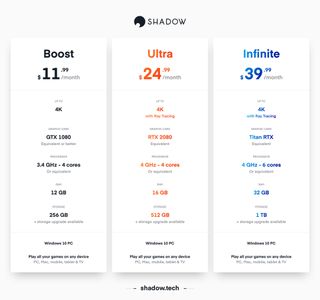Shadow revamps cloud gaming subscriptions, plans PCVR streaming on Oculus Quest
A new 3-tier pricing plan, friendlier smartphone app, and VR cloud gaming on the Oculus Quest.

What you need to know
- Shadow is adding two new pricing tiers to its cloud gaming service; one more affordable, one more powerful.
- 10 additional states are supported, making Shadow available in all 48 contiguous states in the U.S.
- Oculus Quest owners can sign up for the Shadow VR beta, which brings PC VR cloud gaming to the Quest.
Shadow is revamping its cloud gaming offerings with a brand new 3-tier pricing plan, brand new smartphone apps with fast launching for your favorite games, and the ability to stream PC VR games straight to your Oculus Quest. The new 3-tier pricing plan includes a more affordable pricing plan that's half the price of the original, as well as an "infinite" tier plan that offers a significantly more powerful gaming experience. Both the existing "ultra" plan and the new, more expensive "Infinite" plan include the ability to utilize NVIDIA's RTX ray tracing on new games and support for up to 144 FPS; a big deal for folks who don't want to shell out thousands for a new PC.
While pricing details can be found in the chart below, the gist of it is this: $11.99 a month nets you a killer gaming rig that can be played on virtually any platform you enjoy using. Whether it's from your smartphone at work, through a TV powered by Android TV, your work laptop or, soon, through the Oculus Quest, Shadow's Windows 10-powered VMs can play any game you own on any platform you've purchased it through. That last part is the key to what makes Shadow special and different from services like Stadia and GeForce Now, where games either have to be specifically developed and approved for those platforms or else risk being pulled from the store.

Shadow's technology works by giving players an entire Windows 10 virtual machine to use every time they log in. That means that, unlike the services mentioned above, you're able to use anything that can be logged into or installed on any Windows 10 computer instead of only being able to choose from a curated list of apps or games. Additional datacenters have opened up access to all 48 states in the contiguous U.S., so if you have an Internet connection with at least 15Mb/s, you're good to go to enjoy Shadow's cloud gaming service.
Shadow is debuting brand new apps for Android phones, tablets, and Android TV to make it easy to play your games anywhere. These new apps include quick access tiles that let you pin your favorite games and launch them in seconds from any device. Since this is a virtual machine and not a curated service, you'll be able to log into your Shadow account and play any game you currently own on any store, including Steam, GOG, Epic Games, and anything else you can think of.



What might be the single most impressive announcement of the day is the Shadow VR Exploration Program, which encompasses an app that gets loaded onto your Oculus Quest where you can view your virtual desktop and play games on SteamVR or via the Oculus Store. While this may seem like a pipe dream, streamers have already tested the concept and can play twitch games like Beat Saber with little to no latency, and that's without the aid of the official Shadow client.
The Shadow VR Exploration Program for Oculus Quest begins April 1, with sign-ups starting today, March 12. You can express your interest and sign up on Shadow's website. The Shadow VR app is an Oculus Quest-exclusive venture for now, as it will enable players to utilize the freedom of the Oculus Quest while still being able to harness the power of PC VR, all without the tether that Oculus Link requires. Shadow is requiring that applicants be close to a datacenter to enroll for this beta, and you can find those details through the signup page.
Get the Windows Central Newsletter
All the latest news, reviews, and guides for Windows and Xbox diehards.
Nick started with DOS and NES and uses those fond memories of floppy disks and cartridges to fuel his opinions on modern tech. Whether it's VR, smart home gadgets, or something else that beeps and boops, he's been writing about it since 2011. Reach him on Twitter or Instagram @Gwanatu
